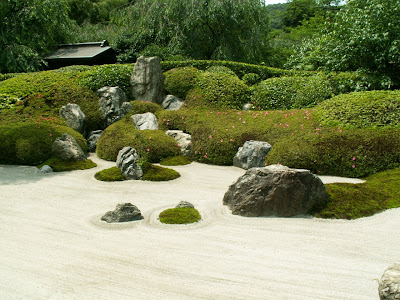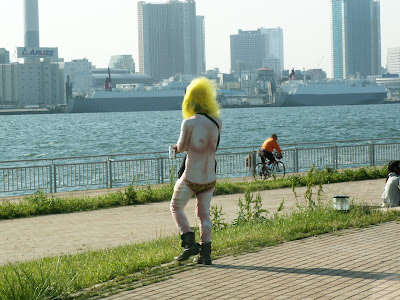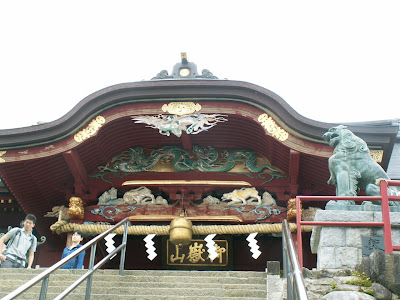Just read about the tragic rampage in Akihabara, which is scarier in that I was in the exact same spot at the exact same time last week. Sadly, 17 people were injured (after a 25 year old drove a lorry through a busy street and then continued by stabbing) and at least 7 died. A few things I want to comment on:
It's a tragedy, no doubt about that. And throughout my time here, there seem to be killing sprees more often. But that these 'freak occurrences' make shocking front page news every time says more about the lack of them than the number of times they actually occur. Japan still has a comparatively minimal crime rate, and I feel safer here than anywhere I've ever been. In the most recent murder rates (per 100,000 people) for example, the US stands at 5.7, the UK at 2.03 and Japan at 0.50.
It's a safe country.
There's not much you can do to prevent someone running people down, but there is a possibility of restraining someone with a knife (on top of the close-proximity needed when using a knife to the victims). Knife crimes are horrific, gun crimes more so, and this is thankfully not a problem in Japan, whether that changes in the future or not.
The biggest problem I see is more deeply centred, and will raise a lot more questions before answers are given. Going to the root of the problem: why are the murders happening at all? It's all too easy to write 'a crazed guy' or as the TimesOnline notes 'a man with a sense of exhaustion and disgust with life'. Fair enough, but why?
Japan is a good country, if you want to play by its rules, which can simply be summed up as 'you join the rat-race, you do what everyone else does and expects of you, you don't complain, you work your arse off, and you'll be fine'.
From the earliest school-days where students (who I've taught anyway) seem to come away with no ability - whether want or freedom to express - of imagination and individuality, Japanese are expected to become a replica from a determined mould of society. (Which is why on the weekends fashion is outrageous). But for those children who have grown up to watch their fathers, and more recently mothers, work 14-hour days in between being piled into trains with people who are no different, or dare I say special, from them, people want more.
This desire has been exaggerated with the internet and other means of modern communication; we can all see how others live, how celebrities enjoy the high life, how our peers have bigger houses, better cars, and less stress and so on. You only have to notice how there is never a week without a reality 'talent' show on tv - everyone wants to be a winner.
And why shouldn't they?
Japan is not a poor country, nor an expensive one. If you want a good meal, have one. A good holiday, take it. There are few here who really could say they have a bad quality of life when you take into consideration the basic needs of warmth, shelter and food.
But needs change, alongside our expectations and comparisons with others.
It's been bugging me recently how many times I hear people say 'I need this' or 'I need that'. No they don't. It's a dangerous word that shouldn't be used lightly. Going slightly off topic, a recent episode of The Apprentice saw the firing of a less-than-typical businesswoman whom the other contestants bullied for her statement that she didn't 'need the job' (earning more money than on offer). Instead, she 'wanted the job' while the others despaired that they 'needed it'. Again, no they don't. They just really want it. They really want to be the winner. Maybe it wasn't so off topic after all.
People want a good life, and rarely it's the case that they get everything they want.
Two things can be drawn from this:
1) It's time to consider what, apart from those basic needs already listed, should be a 'need' drawn from the modernisation of civilisation. Should less work-load be a 'need'? A bi-annual holiday? To be a winner?
2) It's not good enough to say this is what your parents and their parents did, and they were happy so you should be too. With changing times comes changing wants and expectations (and needs). We can no longer rest on what has been, but what must now be. If people are dissatisfied with the choices they are given, it is futile to retort with a tough-luck stance, because people with a 'sense of exhaustion and disgust with life' will continue to show it. As the TimesOnline goes on to say 'Japanese in their 20s use blogs and internet message boards to describe a growing pessimism over the future. They do not want to follow their parents into the drudgery of the “salaryman” life, but have only limited prospects beyond that.'
Tradition is a dangerous thing; if times are changing but peoples' opinions are not allowed to, there is going to be a head-on collision. The same is true for all aspects of tradition, not just culture and society, but fashion, taste, media, religion, relationships, education and so on.
This is something the world is waking up to. Unfortunately Japan had a wake-up call today.
---
Synonyms to upheaval include: agitation, cataclysm, catastrophe, change, chaos, disturbance, revolution, shakeout and turmoil; seemed a suitable heading.
























































.JPG)









